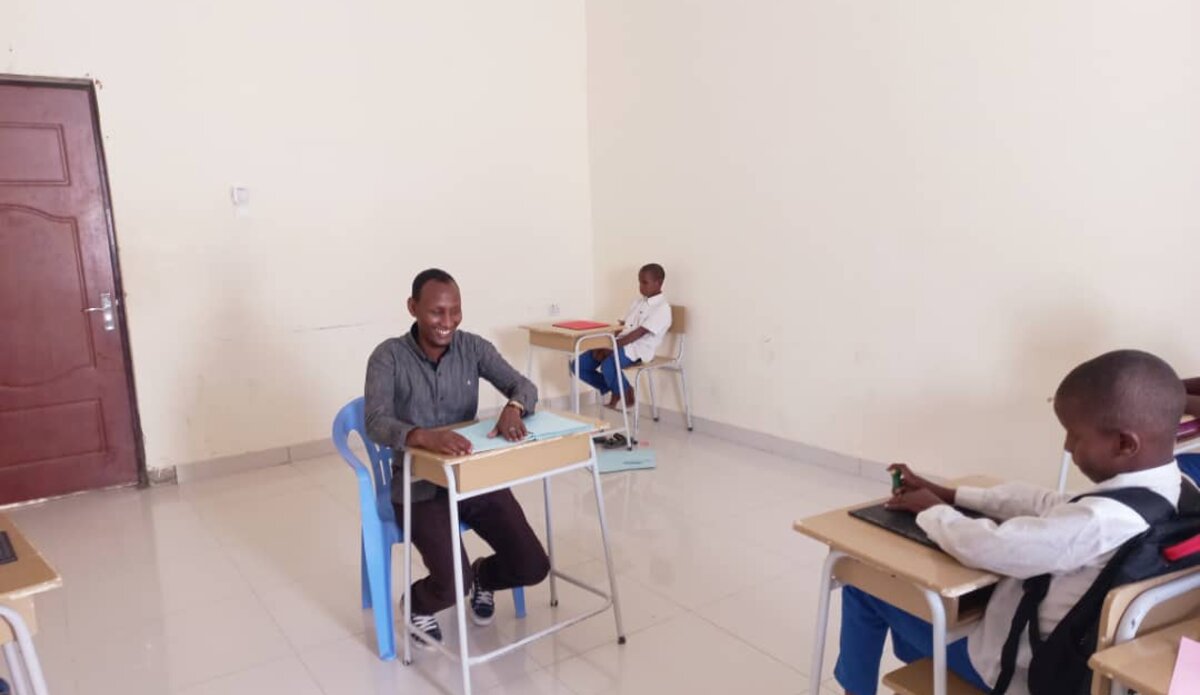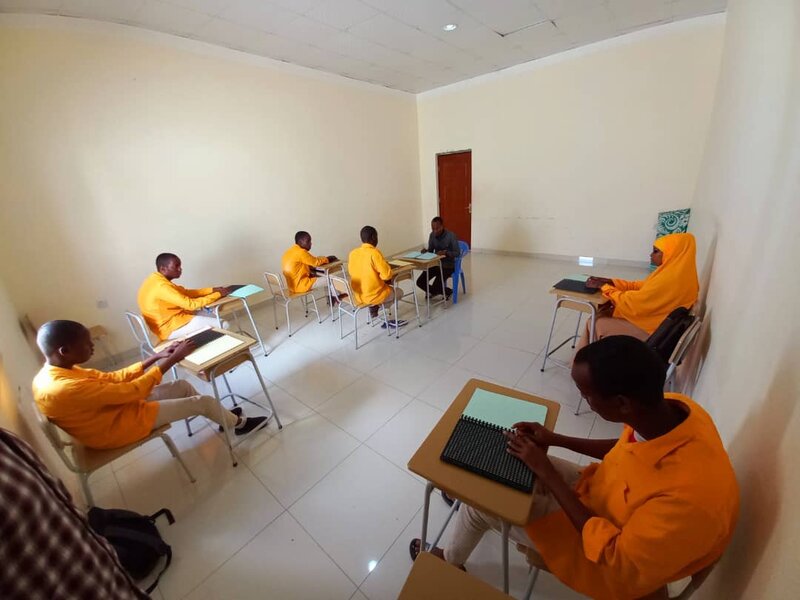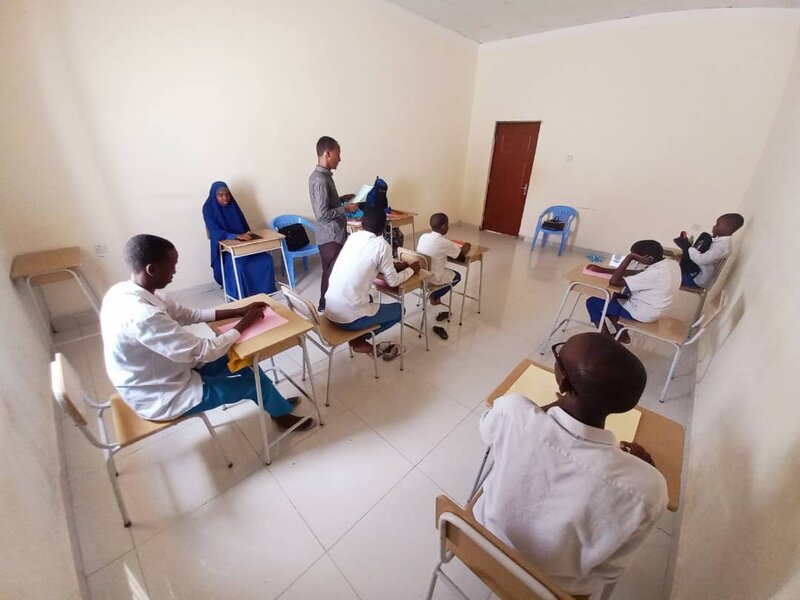
Somalia: Abdulkadir Mohamed Abdullahi: "I Have a Dream to Address the Needs of Visually Impaired Persons Through Education"

However, after he finished his fourth grade at the Salaam primary and middle school in 2001, an unfortunate event happened to him. "I suffered an eye ailment, and I was immediately taken to the ophthalmologist for treatment,” he says. "The doctor carried out eye surgery on me, and I lost my sight.”
Quest for education
After he lost his sight, Mr. Abdullahi fell into depression and thought that he could no longer study because, at the time in Somalia, there was no system to educate the visually impaired. Nobody understood or cared about their needs.
But his depression and desperation did not last for long. Mr. Abdullahi returned from Bur-salah village to Galkayo city and, in 2005, he joined the Al-Basar Institute for the Blind in Garowe, Puntland.
"I shed tears of joy when I returned to middle school three years later, wearing a student uniform. It was a special day for me, and I shared my joy with my peers,” Mr. Abdullahi says.
However, when he joined Omar Samatar High School in 2008, Mr. Abdullahi studied with students who were not visually impaired, which he believes had a profound negative impact on his academic life. This was because none of the private high schools had facilities that catered for the visually impaired students. There was no braille and teachers were not trained on how to teach them or adapt to their needs.
After high school, his quest for higher education led him to Mogadishu.

"I joined Somaville University in Mogadishu in 2014 to study an undergraduate degree in international relations. During my university studies, I faced the same challenges as in middle school. My biggest one was finding teachers who could understand my special needs, as they were not trained in teaching students like me. But, with the help of some of my collogues and technology – I would upload the teachers’ presentations and lessons in audible format on my phone, have my some of my classmates revise them again and again after each lesson, and would listen to them at home – I overcome the challenges. Fortunately, I graduated and celebrated it with my friends and family in 2018,” he notes.
Becoming a teacher
Since he was taught by teachers who were not visually impaired, Mr. Abdullahi said he faced many problems. For example, he recounted how difficult it was for him to understand a subject like mathematics taught by teachers who could not understand his needs. Not seeing the numbers on the board presented challenges that went unnoticed by those teachers.
That led Mr. Abdullahi to continually think about becoming a teacher and addressing the plight of visually impaired individuals like himself. This led him to start teaching at a centre for students with special needs before he finished high school.
"In 2010, I started working at a centre in Galkayo that taught people with special needs such as visually impaired persons, and the deaf. I was especially hired to be a visionary teacher. I worked there for a year, and it was my first time working as a teacher,” he says.
His teaching career continued to grow as he later began working in 2014 at one of the country’s most prominent schools for the visually impaired — the Al-Nur school in Mogadishu.
"I teach subjects such as maths and Somali language, and I enjoy teaching these subjects and teaching Somali boys and girls, as I know the hardships I have gone through and I do not want them to go through the same ordeal,” he says, adding, "I have always understood the needs of these students, as I have studied under similar circumstances.”
Mr. Abdullahi has a dream to address the needs of visually impaired persons through education and hopes that his postgraduate studies, which he will soon undertake, will enable him to pass it on to those with special needs like him.
"I am convinced that educating people with disabilities can contribute to the development of this country. Recognizing that many people with disabilities like me need the country to do more for us, I am confident that educating and supporting people with disabilities will not be in vain or lost,” Mr. Abdullahi says.
Awareness and education
Mr. Abdullahi highlights that there is a great need to raise awareness and educate people on the needs of persons with special needs.
"Many people believe that persons with special needs cannot do everything like the rest of society. That is wrong, and it was not based on reality,” he says. "That even leads to parents believing that their kids with special needs cannot learn. That is not true. The time has come for us to face reality. The community must put more effort in educating the desperate youth that needs education and schooling, now more than ever.”
In addition to becoming a teacher, Mr. Abdullahi also dreamed of one day becoming a journalist to fight for the rights of people with special needs – he has achieved that dream too.
"I have worked for several local media outlets including Gooboog FM, Mandeeq FM, Star FM and Rugsan from 2014 to the beginning of 2021, I have produced reports and programmes advocating for people with special needs, and have reached the level of programme editor,” says the 29-year-old teacher.
His work in the media has raised awareness about the need to change the perception of professionalism for people with special needs.
"I am still looking forward to working with the media and, as a teacher, I know that teaching and journalism can go a long way. They are similar and compatible,” he says.
The teacher and journalist also has artistic talent, and has composed songs and poems widely used in some of the country’s media.
"I have always loved literature. I am aware of its importance. I have written many poems and awareness songs, mostly about people with special needs. I want to make their voices heard, as well as promote the important role of arts in the community,” he concludes.

International Day of Persons with Disabilities
Since 1992, the International Day of Persons with Disabilities has been observed annually on 3 December. The observance of the Day aims to promote an understanding of disability issues and mobilize support for the dignity, rights and well-being of persons with disabilities. It also seeks to increase awareness of gains to be derived from the integration of persons with disabilities in every aspect of political, social, economic and cultural life.
This year’s theme is ‘Leadership and participation of persons with disabilities toward an inclusive, accessible and sustainable post-COVID-19 world.’ The day stresses that the disability inclusion is a very important element in upholding human rights, sustainable development, peace and security.
So far, the global COVID-19 crisis has exacerbated pre-existing
inequalities and showed how appalling the exclusion of people with
disabilities is. People with disabilities ― one billion people in the
world ― are one of the most excluded groups on Earth and they were hit
the hardest by the pandemic in terms of fatalities, according to the
UN.
Source: UNSOM
Leave a comment
- Popular
- Rated
- Commented
04/11/2021 - 11:05:02
12/03/2023 - 22:58:08
22/01/2023 - 11:24:06
13/12/2015 - 09:27:08
01/03/2021 - 09:00:37
Opinions
30/04/2024 - 01:33:18
17/04/2024 - 22:46:39
08/03/2024 - 02:04:01
Politics
06/05/2024 - 02:52:53
02/05/2024 - 23:52:49
30/04/2024 - 01:33:18
Terror Watch
12/05/2024 - 00:19:20
07/05/2024 - 15:08:55
Press Releases
30/04/2024 - 22:03:16
 0
0 


































Somalia: Abdulkadir Mohamed Abdullahi: "I Have a Dream to Address the Needs of Visually Impaired Persons Through Education"
Mogadishu - Somalia Mr. Abdulkadir Mohamed Abdullahi was born in the rural area of the Mudug region, Puntland, in Somalia, in 1992, with normal vision. The father of one was born to a family of pastoralists. He was brought to Galkayo city at the age